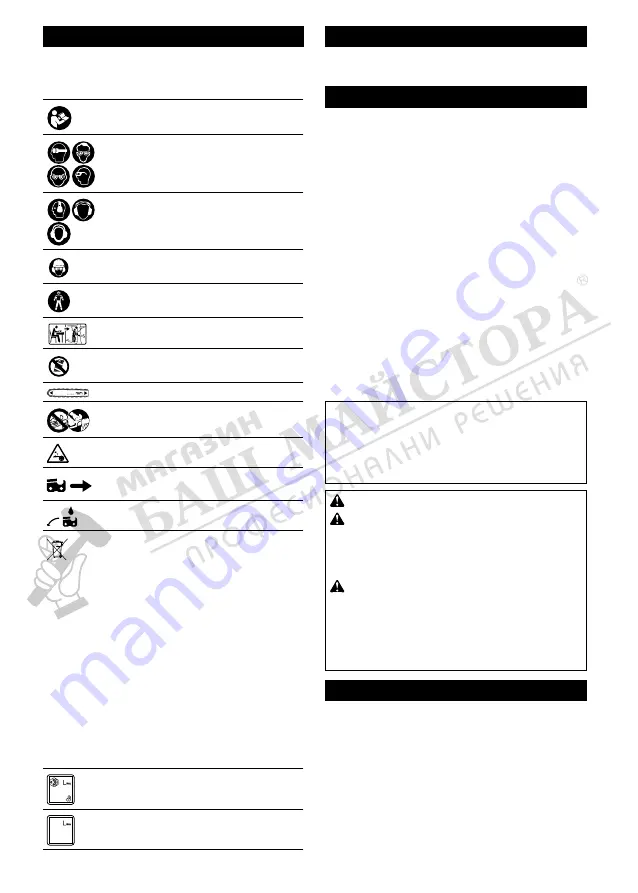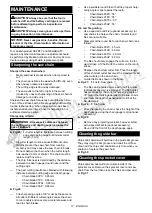
9 ENGLISH
Symbols
The followings show the symbols which may be used
for the equipment. Be sure that you understand their
meaning before use.
Read instruction manual.
Wear safety glasses.
Wear ear protection.
Wear a helmet, goggles and ear protection.
Use appropriate protection for foot-leg and
hand-arm.
This saw is to be used by properly trained
operators only.
Do not expose to moisture.
Maximum permissible cut length
Always use two hands when operating the
chain saw.
Beware of chain saw kickback and avoid
contact with bar tip.
Direction of chain travel
Saw chain oil adjustment
Ni-MH
Li-ion
Only for EU countries
Due to the presence of hazardous com-
ponents in the equipment, waste electrical
and electronic equipment, accumulators
and batteries may have a negative impact
on the environment and human health.
Do not dispose of electrical and electronic
appliances or batteries with household waste!
In accordance with the European Directive
on waste electrical and electronic equip-
ment and on accumulators and batteries
and waste accumulators and batteries,
as well as their adaptation to national law,
waste electrical equipment, batteries and
accumulators should be stored separately
and delivered to a separate collection point
for municipal waste, operating in accor-
dance with the regulations on environmen-
tal protection.
This is indicated by the symbol of the
crossed-out wheeled bin placed on the
equipment.
Guaranteed sound power level according
to EU Outdoor Noise Directive.
Sound power level according to Australia
NSW Noise Control Regulation.
Intended use
The tool is intended for cutting branches and pruning
trees. It is also suitable for tree service.
Noise
The typical A-weighted noise level determined accord-
ing to EN62841-1 and EN ISO 11681-2 as applicable:
Model DUC256
Sound pressure level (L
pA
) : 95 dB (A)
Sound power level (L
WA
) : 103 dB (A)
Uncertainty (K) : 3 dB (A)
Model DUC306
Sound pressure level (L
pA
) : 95 dB(A)
Sound power level (L
WA
) : 103 dB (A)
Uncertainty (K) : 3 dB(A)
Model DUC356
Sound pressure level (L
pA
) : 95 dB(A)
Sound power level (L
WA
) : 103 dB (A)
Uncertainty (K) : 3 dB(A)
Model DUC406
Sound pressure level (L
pA
) : 95 dB(A)
Sound power level (L
WA
) : 103 dB (A)
Uncertainty (K) : 3 dB(A)
Model DUC256C
Sound pressure level (L
pA
) : 95 dB(A)
Sound power level (L
WA
) : 103 dB (A)
Uncertainty (K) : 3 dB(A)
NOTE:
The declared noise emission value(s) has been
measured in accordance with a standard test method
and may be used for comparing one tool with another.
NOTE:
The declared noise emission value(s)
may also be used in a preliminary assessment of
exposure.
WARNING:
Wear ear protection.
WARNING:
The noise emission during actual
use of the power tool can differ from the declared
value(s) depending on the ways in which the
tool is used especially what kind of workpiece is
processed.
WARNING:
Be sure to identify safety mea-
sures to protect the operator that are based on an
estimation of exposure in the actual conditions of
use (taking account of all parts of the operating
cycle such as the times when the tool is switched
off and when it is running idle in addition to the
trigger time).
Vibration
The vibration total value (tri-axial vector sum) deter-
mined according to EN62841-1 and EN ISO 11681-2 as
applicable:
Model DUC256
Work mode: cutting wood
Vibration emission (a
h,W
) : 3.6 m/s
2
Uncertainty (K) : 1.5 m/s
2
Model DUC306
Work mode: cutting wood
Vibration emission (a
h,W
) : 3.6 m/s
2
Uncertainty (K) : 1.5 m/s
2
Summary of Contents for DUC356Z
Page 2: ...2 Fig 1 3 4 5 7 8 14 15 17 9 10 11 12 19 20 22 18 13 16 2 6 21 1 Fig 2 1 2 3 Fig 3 2 1 Fig 4 ...
Page 3: ...3 1 2 Fig 5 2 1 3 Fig 6 1 2 Fig 7 1 2 3 2 3 Fig 8 1 2 Fig 9 1 Fig 10 ...
Page 4: ...4 1 2 Fig 11 2 3 4 1 4 Fig 12 1 Fig 13 1 2 Fig 14 1 Fig 15 1 2 3 Fig 16 1 Fig 17 1 2 Fig 18 ...
Page 5: ...5 Fig 19 Fig 20 Fig 21 1 2 Fig 22 Fig 23 1 2 Fig 24 2 2 1 1 3 1 Fig 25 30 30 55 55 Fig 26 ...
Page 6: ...6 1 2 Fig 27 30 1 5 1 Fig 28 Fig 29 Fig 30 Fig 31 1 2 Fig 32 1 2 Fig 33 1 2 Fig 34 ...





































